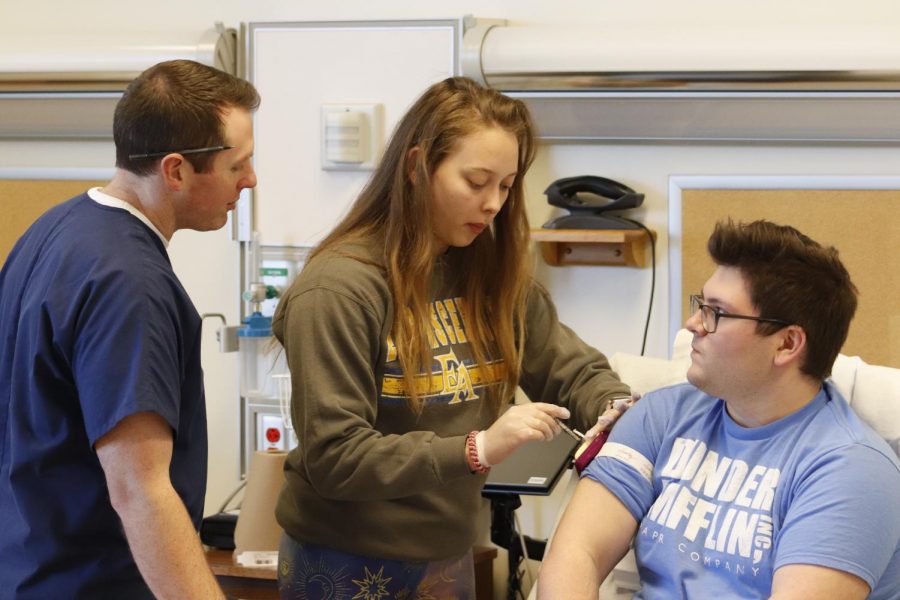Nursing is rigorous, but a rewarding curriculum
Jacob Lofton/The Lion’s Roar
Sophomore Isabella Trinka practices injections on sophomore Austin McAndrew in nursing instructor Jamie Davis’s class. Nursing is known to have a rigorous and time-consuming curriculum. Students not only must take pre-requisite courses but are also required to complete clinicals, hands-on courses in which nursing majors learn, practice and are tested on their on-site skills.
There are a few majors that are well known to be very difficult and time-consuming. Nursing is one such major to have that reputation.
While many students have heard about the nature of the university’s nursing program, some of the students and faculty feel there is a sense of pride in completing some of the difficult tasks.
Ashley Ducre, a junior nursing major, described the amount of time she reserves for studying.
“I like to set aside 30 hours a week to studying, and I’ve been pretty successful with it,” said Ducre. “I’ve had some friends study for longer and some study for less time. It all depends on the person and how much they’d need to review.”
In addition to the time investment required, Ducre added that it is necessary to get off on a strong start, since bad grades could affect a student’s ability to get into clinicals.
“In the first semesters, it’s easy to get distracted and not get things done to the best of your ability,” mentioned Ducre. “It’s important to remember that every A counts.”
To instructors, some common mistakes students make reside in their preparation and time-management, whether it be due to work or test-taking strategies.
Nursing instructor Erin Hoffman included some of the common problems that can affect students.
“Many students need to financially have a job, which takes time away from studying,” explained Hoffman. “Sometimes, they can also underestimate a test and not put forth the required effort. Some also need to work on test-taking skills.”
A large portion of the nursing curriculum involves clinicals. These are hands-on courses in which students are putting their acquired knowledge into practice while learning new on-site skills.
Hoffman went on to explain why the clinical courses required for the major have attained such an intimidating reputation.
“Clinical courses are tough for a variety of reasons,” said Hoffman. “Students are caring for human patients, performing difficult skills for the first time. The patient’s well being is determined by how well the student performs these actions.”
In these courses, students must utilize the knowledge they have been learning in their previous classes and are graded on their implementation of that information. Hoffman shared what characteristics instructors look for in the students.
“The student has to use critical thinking, have good communication skills and prioritize actions,” said Hoffman. “They also need to learn about all medications and what their action is on the body with possible side effects.”
Many students change their major from nursing during the first year. Hoffman shared some advice for prospective students who are looking at majoring in nursing.
“Nursing courses are more difficult than the pre-requisite courses, so if you are struggling with math and science, know that it will not get easier,” commented Hoffman. “On the other hand, nursing is a wonderful career with a variety of options, so if you know this is what you want to do, it is worth the time and effort spent.”
Hoffman also shared what she enjoys most as an instructor in the nursing program.
“I love seeing the joy on my students’ faces when they complete a task successfully,” shared Hoffman.
Ducre echoed the sentiments, sharing her feelings about what can be learned through the tough schedule.
“It’s a very hard but very rewarding major to be in,” said Ducre. “As long as you stay focused but also give yourself necessary breaks here and there, anyone can be successful.”
Your donation will support The Lion's Roar student journalists at Southeastern Louisiana University.
In addition, your contribution will allow us to cover our annual website hosting costs.
No gift is too small.

Jacob Lofton is a music education major from Prairieville. He has been a staff reporter with The Lion’s Roar since the Fall of 2019 and spends his spare...





